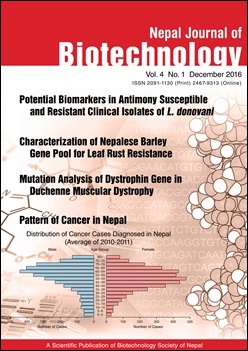Multiplex Ligation Dependent Probe Amplification Based Mutation Analysis of Dystrophin Gene in Nepalese Patients with Duchenne Muscular Dystrophy
DOI:
https://doi.org/10.3126/njb.v4i1.16345Keywords:
Duchene muscular dystrophy, Multiplex ligation dependent probe amplification, Mutation, NepalAbstract
Duchenne muscular dystrophy (DMD) is X-linked recessive neuromuscular disorders caused due to mutation in dystrophin gene, leading to progressive muscle weakness. This study was done to identify mutation in dystrophin gene in Nepalese patients with DMD using Multiplex Ligation Dependent Probe Amplification (MLPA) assay in Nepal. Twenty one patients from different regions of Nepal, who were clinically diagnosed as DMD were enrolled in the study. Peripheral blood samples were collected in EDTA vials, gDNA was extracted, and deletion mutation in the dystrophin gene was analysed using Multiplex Ligation Dependent Probe Amplification (MLPA) assay.
Exon deletion mutation in the dystrophin gene was observed in 14 (66.6%) out of 21 DMD cases. The most common exon deletion was observed and confined in exon 7-14 and 45-53 of dystrophin gene. The location of deletion in dystrophin gene is apparently non-random with a preponderance found in the hot spot regions. Use of MLPA is useful in detecting copy number changes in DMD proband and suspected carriers in Nepal.
Downloads
Downloads
Published
How to Cite
Issue
Section
License
Copyright Notice:
The manuscript submitted to NJB must be an original contribution, not previously published and should not be under consideration for publication elsewhere. When the manuscript is accepted for publication, the authors agree to automatically transfer the copyright of the article to the publisher. It should grant permission to any third party, in advance and in perpetuity, the right to use, reproduce or disseminate your article, according to the NJB copyright and license agreement.
Authors transfer copyright to the publisher as part of a journal publishing agreement but have the rights to: Share their article for Personal Use, Internal Institutional Use and Scholarly Sharing purposes, with the NJB applies the Creative Commons Attribution-NonCommercial CC BY-NC license to all the works we publish after Jun 2020 (Before it was CC BY-NC-ND). Under this license, authors agree to make articles legally available for reuse, without permission or fees, for virtually any non-commercial purpose. Anyone may remix, adapt, and build upon your work non-commercially, and although their new works must also acknowledge you and be non-commercial, they don’t have to license their derivative works on the same terms. More details on CC BY-NC refer to its Licence Deed and Legal Code.






